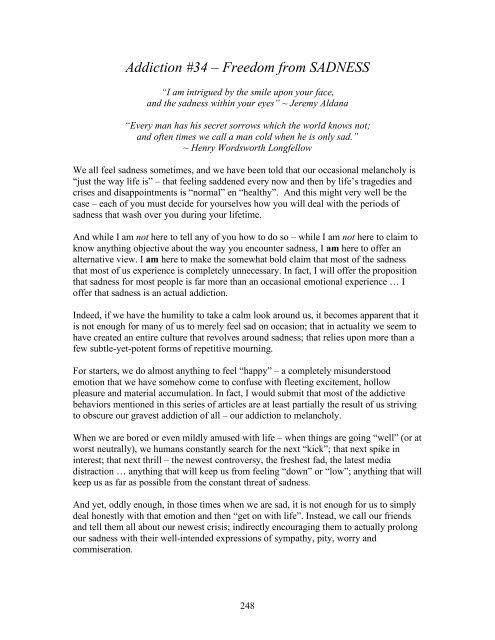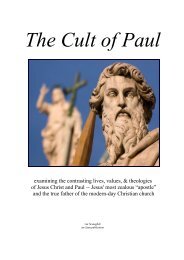Licking the Razor's Edge (2015)
Recognizing the hidden addictions that bind you, … to then set your True Self free
Recognizing the hidden addictions that bind you,
… to then set your True Self free
You also want an ePaper? Increase the reach of your titles
YUMPU automatically turns print PDFs into web optimized ePapers that Google loves.
Addiction #34 – Freedom from SADNESS<br />
“I am intrigued by <strong>the</strong> smile upon your face,<br />
and <strong>the</strong> sadness within your eyes” ~ Jeremy Aldana<br />
“Every man has his secret sorrows which <strong>the</strong> world knows not;<br />
and often times we call a man cold when he is only sad.”<br />
~ Henry Wordsworth Longfellow<br />
We all feel sadness sometimes, and we have been told that our occasional melancholy is<br />
“just <strong>the</strong> way life is” – that feeling saddened every now and <strong>the</strong>n by life’s tragedies and<br />
crises and disappointments is “normal” en “healthy”. And this might very well be <strong>the</strong><br />
case – each of you must decide for yourselves how you will deal with <strong>the</strong> periods of<br />
sadness that wash over you during your lifetime.<br />
And while I am not here to tell any of you how to do so – while I am not here to claim to<br />
know anything objective about <strong>the</strong> way you encounter sadness, I am here to offer an<br />
alternative view. I am here to make <strong>the</strong> somewhat bold claim that most of <strong>the</strong> sadness<br />
that most of us experience is completely unnecessary. In fact, I will offer <strong>the</strong> proposition<br />
that sadness for most people is far more than an occasional emotional experience … I<br />
offer that sadness is an actual addiction.<br />
Indeed, if we have <strong>the</strong> humility to take a calm look around us, it becomes apparent that it<br />
is not enough for many of us to merely feel sad on occasion; that in actuality we seem to<br />
have created an entire culture that revolves around sadness; that relies upon more than a<br />
few subtle-yet-potent forms of repetitive mourning.<br />
For starters, we do almost anything to feel “happy” – a completely misunderstood<br />
emotion that we have somehow come to confuse with fleeting excitement, hollow<br />
pleasure and material accumulation. In fact, I would submit that most of <strong>the</strong> addictive<br />
behaviors mentioned in this series of articles are at least partially <strong>the</strong> result of us striving<br />
to obscure our gravest addiction of all – our addiction to melancholy.<br />
When we are bored or even mildly amused with life – when things are going “well” (or at<br />
worst neutrally), we humans constantly search for <strong>the</strong> next “kick”; that next spike in<br />
interest; that next thrill – <strong>the</strong> newest controversy, <strong>the</strong> freshest fad, <strong>the</strong> latest media<br />
distraction … anything that will keep us from feeling “down” or “low”; anything that will<br />
keep us as far as possible from <strong>the</strong> constant threat of sadness.<br />
And yet, oddly enough, in those times when we are sad, it is not enough for us to simply<br />
deal honestly with that emotion and <strong>the</strong>n “get on with life”. Instead, we call our friends<br />
and tell <strong>the</strong>m all about our newest crisis; indirectly encouraging <strong>the</strong>m to actually prolong<br />
our sadness with <strong>the</strong>ir well-intended expressions of sympathy, pity, worry and<br />
commiseration.<br />
248


















